|
|
|
Sort Order |
|
|
|
Items / Page
|
|
|
|
|
|
|
| Srl | Item |
| 1 |
ID:
133428
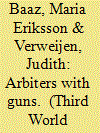

|
|
|
|
|
| Publication |
2014.
|
| Summary/Abstract |
Based on extensive field research in the Democratic Republic of the Congo (DR Congo), this article elucidates the logics, processes and readings surrounding certain 'extra-military' practices enacted by the Congolese army, namely the processing of various types of disputes between civilians. Exceeding the boundaries of the domain of 'public security', such activities are commonly categorised as 'corruption'. Yet such labelling, founded on a supposed clear-cut public-private divide, obscures the underlying processes and logics, in particular the fact that these practices are located on a blurred public-private spectrum and result from both civilian demand and military imposition. Furthermore, popular readings of military involvement in civilian disputes are highly ambiguous, simultaneously representing it as 'abnormal' and 'harmful', and normalising it as 'making sense' - reflecting the militarised institutional environment and the weakness of civilian authorities in the eastern DR Congo. Strengthening these authorities will be vital for reducing this practice, which has an enkindling effect on the dynamics of conflict and violence.
|
|
|
|
|
|
|
|
|
|
|
|
|
|
|
|
| 2 |
ID:
134291
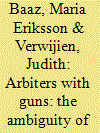

|
|
|
|
|
| Summary/Abstract |
Based on extensive field research in the Democratic Republic of the Congo (DR Congo), this article elucidates the logics, processes and readings surrounding certain ‘extra-military’ practices enacted by the Congolese army, namely the processing of various types of disputes between civilians. Exceeding the boundaries of the domain of ‘public security’, such activities are commonly categorised as ‘corruption’. Yet such labelling, founded on a supposed clear-cut public–private divide, obscures the underlying processes and logics, in particular the fact that these practices are located on a blurred public–private spectrum and result from both civilian demand and military imposition. Furthermore, popular readings of military involvement in civilian disputes are highly ambiguous, simultaneously representing it as ‘abnormal’ and ‘harmful’, and normalising it as ‘making sense’ – reflecting the militarised institutional environment and the weakness of civilian authorities in the eastern DR Congo. Strengthening these authorities will be vital for reducing this practice, which has an enkindling effect on the dynamics of conflict and violence.
|
|
|
|
|
|
|
|
|
|
|
|
|
|
|
|
| 3 |
ID:
146117
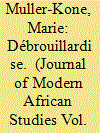

|
|
|
|
|
| Summary/Abstract |
This article explores the relationship between transnational governance initiatives for ‘conflict-free’ certification in the eastern provinces of the Democratic Republic of the Congo (DRC) and the regulatory pluralism one finds on the ground. Efforts in certifying artisanal gold mining are scrutinised by analysing how three different gold mining sites in the DRC's South Kivu province are governed. Most artisanal mining in the DRC is usually referred to as ‘informal’ – a term associated with non-state actors. Instead, the article introduces the idea of a mode of governing that follows the principle of ‘débrouillardise’, which combines different rule systems and state and non-state regulators. It argues that ‘conflict-free’ governance will need to improvise via ad hoc agreements on the legal status of mining sites among state authorities, economic actors and international monitors. The act of declaring mining sites legal will provide for the semblance of a ‘conflict-free’ status and a unitary state system of rule, while in practice, the plurality of regulatory authority will not be reversed.
|
|
|
|
|
|
|
|
|
|
|
|
|
|
|
|
| 4 |
ID:
140597
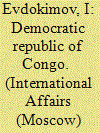

|
|
|
|
|
| Summary/Abstract |
THE YEAR 1960 has come to be known as the Year of Africa as 17 states of the Black Continent became independent that year, throwing off the chains of colonialism. Among them was the Belgian Congo, the then name of today's Democratic Republic of Congo (DR Congo), the world's most populated Francophone country and, in terms of area, the largest country in Sub-Saharan Africa. The Belgian Congo became independent on June 30, 1960. Today, June 30 is DR Congo's main national holiday.
|
|
|
|
|
|
|
|
|
|
|
|
|
|
|
|
| 5 |
ID:
175346
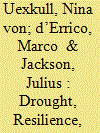

|
|
|
|
|
| Summary/Abstract |
The effects of climate variability and change on security are debated. While this topic has received considerable attention in both policy circles and academia, the microlevel pathways and conditions under which climatic shocks increase conflict risks are poorly understood. We suggest that household resilience provides one key to understanding these relationships. Using novel household survey data from two conflict-affected regions in Eastern Democratic Republic of the Congo, we study variation in the support for violence related to reported exposure to drought and resilience metrics. Using comprehensive multifaceted objective and subjective indicators of resilience, we find that less resilient respondents who report having experienced drought and associated losses are more likely to be supportive of the use of political violence. In contrast, our findings suggest that there is no general association between reporting drought exposure and support for violence.
|
|
|
|
|
|
|
|
|
|
|
|
|
|
|
|
| 6 |
ID:
188858
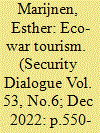

|
|
|
|
|
| Summary/Abstract |
This article introduces ‘eco-war tourism’, a growing niche in which tourists venture into war zones to seek adventure and ‘save’ nature from its violent surroundings. In Virunga National Park in eastern Democratic Republic of Congo, such tourists can experience the ‘threat of mortality’ while visiting mountain gorillas, contribute to the survival of the park and supposedly participate in regional peacebuilding. This article considers how the amalgamated commodification of war and gorillas leads to the bunkerization of tourism, the reconfiguration of space into ‘safe’ and ‘dangerous’ areas and the militarization of conservation. It links critical security studies and political ecology to theorize how eco-war tourism intensifies green militarization and how militarized conservation itself becomes a spectacularized tourist attraction. Eco-war tourism is informed by, and productive of, various affective geographies, entrenched in colonial durabilities that produce Eurocentric ideas about how and by whom nature should be protected. I call for critical security studies to examine how diverse security interventions – e.g. military, tourism, humanitarianism and conservation – are entangled in and reconfigure inherently political nature–society relations and underscore the futility of approaching ‘society’ and ‘the environment’ as separate fields of security.
|
|
|
|
|
|
|
|
|
|
|
|
|
|
|
|
| 7 |
ID:
158645


|
|
|
|
|
| Summary/Abstract |
In the Democratic Republic of Congo, donors promoted rapid liberalisation and presidential elections in the aftermath of the war, and after two terms, President Kabila has not left office. This article engages with the question of how liberalisation and elections are connected, and how they are related to the extension of presidential power. It finds that the international market for minerals has shaped the domestic political economy but its nature has effectively been ignored in the formulation of donor policy; efforts at regulating trade have been concentrated on due diligence of origin in Congo but have not addressed the secrecy of international trade. Liberalisation has removed control of economic resources from Congo, provided returns for elite politicians and funded violence to control the disenfranchised population. The offshore companies are the elephant in the room; without acknowledging them, analysis of the liberalisation and its interaction with presidential tenure lacks assessment of the opportunities, interests and power that shaped the processes.
|
|
|
|
|
|
|
|
|
|
|
|
|
|
|
|
| 8 |
ID:
084473
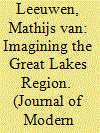

|
|
|
|
|
| Publication |
2008.
|
| Summary/Abstract |
The idea has gained ground in recent years that, as conflicts in the countries of the Great Lakes Region are strongly interlinked, regional approaches are necessary to resolve them. This interest in regional dimensions of conflict and peacebuilding also gains currency in other parts of the world. Attention to regional approaches is reflected in the efforts of international organisations and donors to promote civil society peacebuilding. They assume that regional cooperation and exchange between civil society organisations contribute to peace, and provide an alternative to single-country interventions or regional diplomatic initiatives. This paper explores how such assumptions work out in practice. Experiences in the Great Lakes Region show that local and international organisations have difficulty in analysing the regional character of conflict and arriving at collaborative regional strategies. Moreover, local civil society organisations are deeply embedded in the politics of regional conflict. Consequently, the shift to regional peacebuilding approaches remains more theoretical than practical. This paper suggests that international supporting organisations need to adjust their ambitions in regional peacebuilding, but nonetheless have roles in fostering regional identification among civil society organisations.
|
|
|
|
|
|
|
|
|
|
|
|
|
|
|
|
| 9 |
ID:
158104
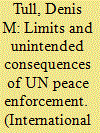

|
|
|
|
|
| Summary/Abstract |
Recent scholarship has discerned an increasing tendency of the UN Security Council to push the boundaries of UN peacekeeping beyond traditional doctrine by equipping peace operations with ever more robust and even peace enforcement mandates. The first and most frequently cited example of this turn is the so-called Force Intervention Brigade (FIB) in the DR Congo. Yet, a comprehensive account of the FIB experience is still missing. Authorized in March 2013 to launch offensive military operations against insurgent groups, the FIB may come to epitomize a sea change in the transition from robust peacekeeping to a qualitatively different kind of UN peace operation. Thus, studying the FIB can offer important insights about the advantages and challenges that may be in store for the UN, should the organization indeed turn towards peace enforcement. The articles analyses the origins, performance and consequences of the FIB in terms of conflict resolution and state-building. It also examines its organizational impact on the UN peace operation in which it was embedded (Monusco). It finds that the FIB has not proven to be the game changer. Instead, it had unintended negative consequences both on state-building and the performance of UN peacekeepers.
|
|
|
|
|
|
|
|
|
|
|
|
|
|
|
|
| 10 |
ID:
171076
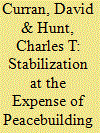

|
|
|
|
|
| Summary/Abstract |
The “uploading” of stabilization to UN peacekeeping presents conceptual, political, and practical challenges to the UN’s role in global governance and international conflict management. While scholarly research on stabilization has generally focused on militarization, its relationship to peacebuilding in the context of UN peacekeeping is underexplored. This article examines that relationship. A survey of UN policy frameworks highlights the simultaneous emergence of stabilization and clear expressions of peacebuilding. The article then draws on fieldwork in Mali and the Democratic Republic of Congo to illustrate how stabilization is displacing peacebuilding in the practices of UN peacekeeping. The article argues that the politics of stabilization impede local forms of peacebuilding, at odds with the “Sustaining Peace” agenda, and risks jeopardizing the lauded conflict resolution potential of UN peacekeeping.
|
|
|
|
|
|
|
|
|
|
|
|
|
|
|
|
| 11 |
ID:
188703
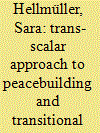

|
|
|
|
|
| Summary/Abstract |
Peace research has taken a local turn. Yet, conceptual ambiguities, risks of romanticization, and critiques of co-option of the “local” point to the need to look for novel ways to think about the interactions of actors ranging from the global to the local level. Gearoid Millar proposes a trans-scalar approach to peace based on a “consistency of purpose” and a “parity of esteem” for actors across scales. This article analyzes the concept of trans-scalarity in the peace process in Ituri, a province in the northeastern Democratic Republic of Congo (DRC). Drawing on qualitative data from more than a year of research in the DRC, I argue that while a trans-scalar approach was taken to end violence, it was not applied to transitional justice initiatives. The result was a negative, rather than a positive peace. By showing the high, but still untapped, potential of trans-scalarity, the article makes three contributions. First, it advances the debate on the local turn by adding empirical insights on trans-scalarity and further developing the concept’s theoretical foundations. Second, it provides novel empirical insights on the transitional justice process in the DRC. Third, it links scholarship on peacebuilding and transitional justice, which have often remained disconnected.
|
|
|
|
|
|
|
|
|
|
|
|
|
|
|
|
| 12 |
ID:
101176
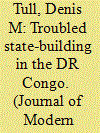

|
|
|
|
|
| Publication |
2010.
|
| Summary/Abstract |
This paper examines contentious state-society and centre-periphery relations in the DR Congo and their implications for state-building. Since the 2006 post-conflict elections, the state's authority has come under fire in the western province of Bas Congo, where a politico-religious group (Bundu Dia Kongo) has emerged as a serious challenger. Enjoying huge local legitimacy, the group has articulated political grievances that the newly elected central government has violently repressed. As locally perceived, elections are a legitimising tool in the hands of the government to impose its unfettered authority in the name of the state-building project. Furthermore, and backed by donors, the Kinshasa authorities also refuse to implement a wide-ranging decentralisation reform. This has fed disenchantment about post-conflict politics in Bas Congo, boding ill for democratic politics and the prospects of state-building in the DR Congo.
|
|
|
|
|
|
|
|
|
|
|
|
|
|
|
|
|
|
|
|
|